
-
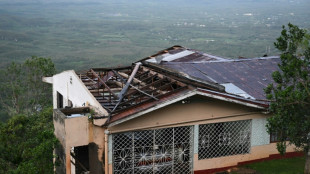 'Nowhere to sleep': Melissa upends life for Jamaicans
'Nowhere to sleep': Melissa upends life for Jamaicans
-
Irish octogenarian enjoys new lease on life making harps

-
 Tanzania blackout after election chaos, deaths feared
Tanzania blackout after election chaos, deaths feared
-
G7 meets on countering China's critical mineral dominance
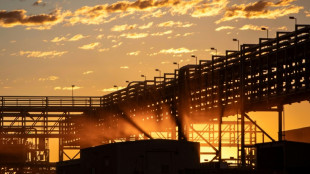
-
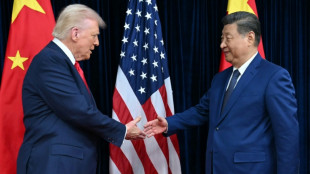 Trump hails tariff, rare earth deal with Xi
Trump hails tariff, rare earth deal with Xi
-
Court rules against K-pop group NewJeans in label dispute

-
 India's Iyer says 'getting better by the day' after lacerated spleen
India's Iyer says 'getting better by the day' after lacerated spleen
-
Yesavage fairytale carries Blue Jays to World Series brink

-
 Bank of Japan keeps interest rates unchanged
Bank of Japan keeps interest rates unchanged
-
Impoverished Filipinos forge a life among the tombstones

-
 Jokic posts fourth straight triple-double as Nuggets rout Pelicans
Jokic posts fourth straight triple-double as Nuggets rout Pelicans
-
UN calls for end to Sudan siege after mass hospital killings

-
 Teenage Australian cricketer dies after being hit by ball
Teenage Australian cricketer dies after being hit by ball
-
As Russia advances on Kupiansk, Ukrainians fear second occupation

-
 Trade truce in balance as Trump meets 'tough negotiator' Xi
Trade truce in balance as Trump meets 'tough negotiator' Xi
-
China to send youngest astronaut, mice on space mission this week

-
 Yesavage gem carries Blue Jays to brink of World Series as Dodgers downed
Yesavage gem carries Blue Jays to brink of World Series as Dodgers downed
-
With inflation under control, ECB to hold rates steady again

-
 Asia stocks muted with all eyes on Trump-Xi meeting
Asia stocks muted with all eyes on Trump-Xi meeting
-
Personal tipping points: Four people share their climate journeys

-
 Moto3 rider Dettwiler 'no longer critical' after crash: family
Moto3 rider Dettwiler 'no longer critical' after crash: family
-
US economy in the dark as government shutdown cuts off crucial data

-
 Trump orders nuclear testing resumption ahead of Xi talks
Trump orders nuclear testing resumption ahead of Xi talks
-
'Utter madness': NZ farmers agree dairy sale to French group

-
 Samsung posts 32% profit rise on-year in third quarter
Samsung posts 32% profit rise on-year in third quarter
-
30 years after cliffhanger vote, Quebec separatists voice hope for independence

-
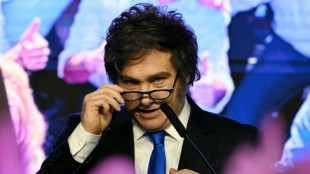 Taxes, labor laws, pensions: what Milei wants to do next
Taxes, labor laws, pensions: what Milei wants to do next
-
South Sudan's blind football team dreams of Paralympic glory

-
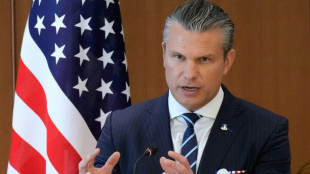 US says 4 killed in new strike on alleged Pacific drug boat
US says 4 killed in new strike on alleged Pacific drug boat
-
What we do and don't know about Rio's deadly police raid

-
 'They slit my son's throat' says mother of teen killed in Rio police raid
'They slit my son's throat' says mother of teen killed in Rio police raid
-
Arteta hails 'special' Dowman after 15-year-old makes historic Arsenal start

-
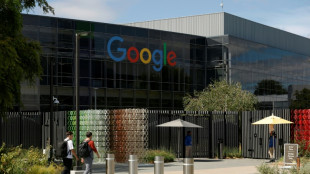 Google parent Alphabet posts first $100 bn quarter as AI fuels growth
Google parent Alphabet posts first $100 bn quarter as AI fuels growth
-
Underwater 'human habitat' aims to allow researchers to make weeklong dives
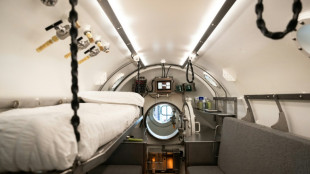
-
 Maresca slams Delap for 'stupid' red card in Chelsea win at Wolves
Maresca slams Delap for 'stupid' red card in Chelsea win at Wolves
-
'Non-interventionist' Trump flexes muscles in Latin America

-
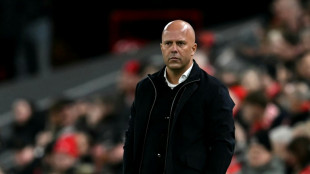 Slot defends League Cup selection despite not meeting 'Liverpool standards'
Slot defends League Cup selection despite not meeting 'Liverpool standards'
-
'Poor' PSG retain Ligue 1 lead despite stalemate and Doue injury

-
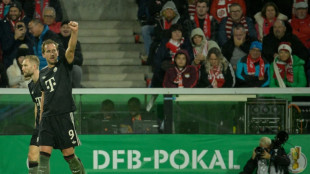 Kane nets twice in German Cup as Bayern set European wins record
Kane nets twice in German Cup as Bayern set European wins record
-
Liverpool crisis mounts after League Cup exit against Palace

-
 Juve bounce back after Tudor sacking as Roma, Inter keep pace with leaders Napoli
Juve bounce back after Tudor sacking as Roma, Inter keep pace with leaders Napoli
-
Kane scores twice as Bayern set European wins record
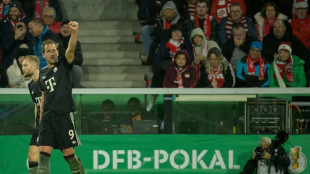
-
 Radio Free Asia suspends operations after Trump cuts and shutdown
Radio Free Asia suspends operations after Trump cuts and shutdown
-
Meta shares sink as $16 bn US tax charge tanks profit
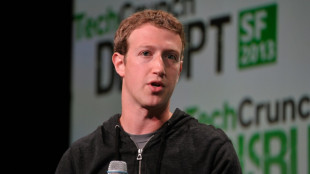
-
 Dollar rises after Fed chair says December rate cut not a given
Dollar rises after Fed chair says December rate cut not a given
-
Google parent Alphabet posts first $100 bn quarter as AI drives growth

-
 Rob Jetten: ex-athlete setting the pace in Dutch politics
Rob Jetten: ex-athlete setting the pace in Dutch politics
-
Juve bounce back after Tudor sacking as Roma keep pace with leaders Napoli

-
 Favorite Sovereignty scratched from Breeders' Cup Classic after fever
Favorite Sovereignty scratched from Breeders' Cup Classic after fever
-
Doue injured as PSG held at Lorient in Ligue 1


Ukraine tensions jumble up Germany's energy puzzle
Rising tensions with Moscow over Ukraine have exposed Germany's problematic dependence on Russian gas, inflaming an already heated debate over soaring energy prices.
As Germany pursues its target to transition to cleaner energy sources over the next decade, Europe's biggest economy has counted on gas temporarily filling the gap while it builds up its sun and wind energy capacity to replace nuclear and coal plants.
But with Russia now providing 55 percent of Germany's gas imports -- up from 40 percent in 2012 -- Berlin's best-laid plans may well go awry if Moscow were to march on Ukraine.
With gas making up 26.7 percent of Germany's total energy consumption and heating one in every two households, Chancellor Olaf Scholz's government has admitted that if sanctions had to be imposed on Russia, they will also hit the German economy.
More precisely, the controversial Nord Stream 2 pipeline, which was set to double supplies of cheap natural gas from Russia to Germany, now hangs in the balance.
In a warning hailed by the United States as "very, very strong", German Foreign Minister Annalena Baerbock has said the pipeline will be part of a sanctions package if Russia made a move on Ukraine.
- Energy security -
Long viewed as a problem by Western allies and Ukraine, the 10-billion-euro ($12 billion) pipeline had been seen by former chancellor Angela Merkel's government as a key stop-gap option while Germany shifts to renewables.
But critics have repeatedly warned that it would only serve to increase German dependence on Russian energy, and Ukraine President Volodymyr Zelensky has branded it a "dangerous geopolitical weapon of the Kremlin".
Yet weaning Germany off Russian energy will be painful.
"If we give up Russian gas and Nord Stream 2, it won't be lights out immediately, but it will be expensive, it will exacerbate unanswered gas supply questions for the future, and we'll have a problem," warned chairman of the mining, chemistry sector union IG BCE, Michael Vassiliadis.
With time pressing, the German government is launching a massive programme to build wind turbines covering two percent of the country's land surface, and require the installation of solar panels on roofs.
"Phasing out the burning of fossil fuels also strengthens Europe in geopolitical terms and protects the climate," Economy Minister Robert Habeck said earlier this month.
But with the nuclear energy phase-out due to be complete by year's end and coal power also to be halted by 2030, Germany will have to make up the difference by raising its gas capacity by a third over the next eight years, according to the Fraunhofer economic institute.
Already, Germany's gas consumption is on the rise. In 2021, it made use of 1.003 billion kWh, an increase of 3.9 percent on the previous year.
But the longer-term strategy does not solve the looming energy emergency at hand.
- 'Alternative' -
To reduce its dependency on Russia in the near future, the government is banking on diversifying its imports.
One "alternative" would be to exhaust the capacity of Europe's liquified natural gas terminals, a source in the economy ministry said.
This solution, in which fresh imports could be delivered from the United States, Australia or Qatar, would, however, come at a price, the source indicated.
Higher costs could give a fresh push to inflation, which has hit multi-year highs in Germany and the eurozone in recent months.
The situation is not made any easier by Germany's exceptionally low gas reserves, which currently sit below 42 percent of full capacity.
Nevertheless, the government sought to put a brave face on the issue.
Dismissing the risk of an acute shortage, Baerbock said on Friday that sufficient supply was "assured".
Z.Ramadan--SF-PST
